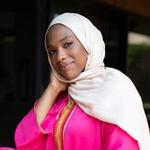How a Viral TikTok Helped Me Safeguard My Hijab as a Black Muslim Woman
Lifestyle
|
Feb 9, 2022
|
4 MIN READ

Tahira Folk of TikTok's @sincerelytahiryy
Tahirah Folk (@sincerelytahiryy) is a 23-year old model who has created TikTok videos calling out the toxic culture of de-centering Black voices in the realms of hijab, modest fashion, and Islamic lifestyle. Watching these videos have been validating and downright refreshing. Tahirah relays her experiences as Black, plus-sized, Muslimah who wears hijab in such a relatable way to the masses on social media, that her videos have racked up millions of views and thousands of comments from women thanking her for using her voice to speak truth to power.
In one viral tiktok in particular, Tahirah created a list of people that can “never come for me for my hijab and my Islamic practices in general,” and each person on the list personally hit home for me. I watched earnestly, applauding the commentary and audibly screaming, “come on, Tahirah!” She was expressing publicly exactly what I had been thinking privately for so long, and it had a way of imparting strength through its relatability.
Whether you are Black or not, it’s important to understand the various ways Black Muslim women are too often called out for how they wear hijab or partake in their Islamic lifestyle. If you find yourself in the following list of people (who knowingly and unknowingly do this), then, Insha’Allah, you can work to not engage in these behaviors.
Tahirah's viral tiktok
I have begun to safeguard my hijab more firmly against judgment or shaming at the hands of every person on this list. Tahirah validated me and hundreds of thousands more women with her video. So, here’s Tahirah’s powerful list:
1. Men: Whether we have allowed men to become centered in discussions about hijab or they have assumed the role of authorities on the subject, either way they are centered in an experience they will never authentically know. Consequently, they have been erasing and replacing the voices of hijabi women who are actually living this lifestyle day to day.
Oftentimes when men do discuss Muslim women’s hijab, they are not coming from place of actual appreciation of our lifestyle, they come from a hurtful angle of judgment. And for that, let’s remove them from the chat.
2. Arabs, specifically Arab women: This one hit home for me as well. Non-Arab women share in the experience that Arab women are constantly positioning themselves as religious authority over non-Arab women due to their Middle Eastern lineage or ability to speak Arabic. But let’s not forget that being Arab, whether you are Black or not, is not an indication of religiosity. As Tahirah says “the way that [Arab women] will really argue down and belittle and dismiss [people who have memorized the Quran] and students of knowledge just because they are Black is really a sickness.”
Particularly when it comes to hijab styles, the sentiment that garments originating from the Middle East are the most valid or religiously authentic ways of dressing is also a widespread misconception. As the Prophet Muhammad (saw) said in his final sermon, “There is no superiority of an Arab over a non-Arab, except in piety.”
3. Non-hijabis: Unfortunately there is a lot of criticism that non-hijabis often dish to hijabis with regards to the way that we dress. And it’s funny because as women, we deal with a lot of shaming for our physical appearance, so instead of tearing each other down, we should be supportive of one another. As Tahirah says simply to Muslim women who don’t wear hijab but like to comment harshly on it: “You don’t even go here,” curtly alluding to the famous line from Mean Girls.

Tahirah Folk of @simplytahiryy
4. Skinny Women: When Tahirah said this, I knew it would go viral. So many plus-sized hijabi women have expressed the feelings of being shamed for their bodies as we try to cover a curvaceous shape under layers of fabric that almost never fully conceals the physiques we were created in. At the hands of thin women who can more easily slip into loose garments and remain covered, full-figured hijabis are fiercely shamed for “allowing” their shapes to show in garments that are supposed to have been able to achieve coverage.
But have women with thinner frames ever tried to achieve the coverage they are able to with a plus-sized body? No. So stay quiet. “If Allah gave you the body-ody-ody that He gave me Masha’Allah, y’all wouldn’t know what to do with it,” Tahirah says. Building a modest, stylish and affordable wardrobe as a plus-sized Black Muslim American is a challenge that does not need to be judged by those who do not share in that struggle.
As a stylist for the past nine years, I have received the most complaints from plus-sized hijabis about the lack of inclusivity with size options, height options and design features that accommodate plus-sized bodies from modest fashion designers and boutiques. The models are typically slender and tall in modest fashion campaigns, and just creating these same garments in an XL is not enough to truly be inclusive.
I have struggled myself, since having my daughters and gaining weight, with being able to cover myself as fully as I used to be able to when I was thinner. Tahirah ends the TikTok with the question of the century, “Is it really modest, or is she just skinny?”
Do any of these resonate with you? What would you add to this list? Let us know in the comments! Or, if you find yourself in this list, there is time and space to do better. None of us are perfect, and it is incumbent upon us all to recognize when we may be doing something unkind and start avoiding the damaging behavior.
Subscribe to be the first to know about new product releases, styling ideas and more.
What products are you interested in?

